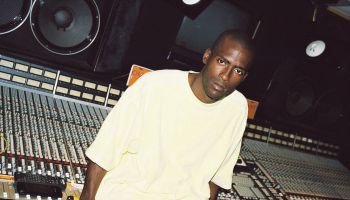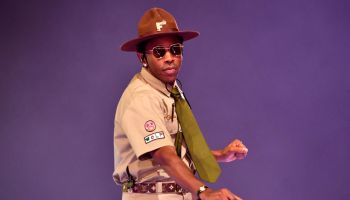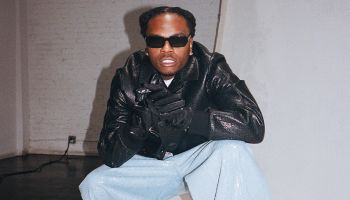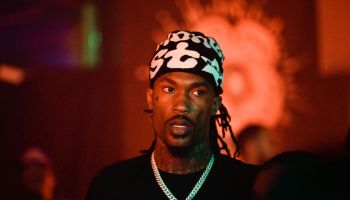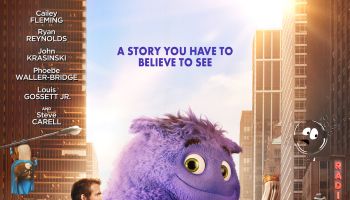Earlier this week (Tuesday, April 26), funk legend Bootsy Collins released his 23rd studio album, “Tha Funk Capital of the World,” a collaborative album with Bootsy and some of his famous friends. George Clinton, Snoop Dogg, Chuck D, Rev. Al Sharpton, Dr. Cornel West, Bela Fleck and Musiq Soulchild are featured on the project, which Collins describes as being an organic process through and through.
The 59-year-old bassist admits that he started recording the project without a clear idea of who’d join in or what he’d call it. However, several tracks later, Collins started flipping through his Rolodex to add that extra element to each tune.
The list of guests on the project may read as random, but Collins hand selected every single person and is pleased with the end result. The finished product: 17 tracks of nothing but the funk!
GlobalGrind: How did “Tha Funk Capital of the World” come about?
Bootsy Collins: I just started out, recorded tracks and I didn’t know what the name of the record was yet, but I just go song by song. I don’t look at the overall concept until it actually comes to me … I had been throwing a lot of different titles around but nothing really stuck. Once I got the album finished, I started hearing what I’m trying to relay. I’m thinking this has to be deep. This is not just a Bootsy party record. This is deeper than that. I threw a few names around and I said the title to a few people and they freaked out. I think I was doing a speech to an audience and I said something about the funk capital and we were in Cincinnati and that’s my hometown. Nothing else had a foundation like that. I figured people would talk about that and think ‘where is the funk capital of the world?’
[pagebreak]
So … where is the funk capital of the world?
For me, the funk capital of the world is any and everywhere I go. It’s not a building. It’s not a city. It’s in your heart. For me it’s the funk, but for you it could be something else. But whatever it is, you take that with you and that’s my message. It’s really about what’s inside. You take that, you build that, you critique it and you make it better. You get really good with what you do. That is my funk capital. But whatever you do, you make it great and that’s what this whole album is saying. That’s the bigger picture. It ain’t just about a small city. It’s about you.
There’s a lot of great people on this project. Did you hand select the people you wanted to work with?
Actually, I did. I was working with a lot of the people that you see on there as well and it made it kind of special for me to work with these people on something that I’m doing. I was working with them on something they were doing, or we were doing it for somebody else. But to have these kinds of voices on something I was doing was a blessing. The songs I do one at a time, so it’s like ‘who do I hear on this song?’ The JB stealer man. Who else could do the sermon like Reverend Al Sharpton? It really wasn’t about that they had to be a musician or they had to be a singer, it was more about for me who could get the point across. Whose voice still has a voice in the community with the people? Who touched the people?
For me that was really important, when I came up, we had a lot of influential voices that you hung on to and gravitated towards. That’s what I wanted to try and create with this album. Not just the music but the voice and I want you to believe in yourself, believe. Because the world teaches you not to believe in anything. You’ve got preachers molesting boys, you’ve got the police, you can’t trust them, you’ve got bankers. Who can people trust? I wanted to give the people something, I call it spreading hope like dope. That’s what I wanted to do with this record. I wanted to be bigger than life, bigger than me. It really isn’t about me, it’s about the people and I wanted to relate that.
[pagebreak]
We spoke with Musiq Soulchild, who is on this project and he said he is really honored to be a part of it.
Yeah and he really took his time. I thought for a minute he wasn’t going to make it. Because it was taking so long, but then I found out in the end that he really wanted to do his best work on this album. I didn’t find out until the last day when I was like, ‘Musiq, man, I need you to get finished with this. I’ve got to turn this in.’ And he said, ‘I’m trying, I’m trying.’ Finally, there it was. And what he did was so perfect. But he didn’t want to turn it in until he got it exactly how he wanted it. That’s dedication. That’s what we lack today. A lot of our young people today lack that kind of dedication. When I see that kind of dedication, that to me is so inspiring. To even see that is incredible. So the people on this record inspired me. I was inspired by them as well and it was an honor for me to have all these people together on this record.
Hip-hop artists and contemporary artists have been sampling and taking from your work and legacy, how do you feel about that? Has there ever been a time when you weren’t too keen on it?
No. Well, you said ‘taking from my work’ and I never thought of it as ‘taking from my work.’ I always saw it as adding to my work. I was so proud that the younger generation liked what I did so much that they wanted to use it. That to me is like, wow. Because, when you’re young and coming up like that, I never thought that I was going to be not doing what I love doing. Then for somebody else to pick it up and say, ‘we like this’ … it was kind of like a wake up call that, ‘man, you better realize what you all did, you better go back and check out.’
As a matter of fact, they start asking me, ‘Have you heard what you did?’ To tell you the truth, I never listened to it. They kept saying you better listen to what you all did. At the end, I never went back and listened to what we did. We were just doing what we felt. And they kept doing that so much that finally I went back and listened and kind of heard what they were talking about. Because they study it, they were really into it. They had the crates of albums, they don’t just listen to it, they play a little bit and study it hard. So that’s a new art form and it’s incredible for me to see how they work in the studio.
[pagebreak]
Who do you listen to? Are there any contemporary artists you are really digging right now?
To tell you the truth, when I said I don’t listen to my stuff, I really don’t listen to nobody. I’ve kind of always been like that because I never wanted to be influenced by anything other than what’s coming in. I always felt like I was some kind of antenna and I transmit what I receive but if I get distracted from that, I wouldn’t transmit the right thing. That’s something that’s always been with me, it’s not something that just happened. Before I really learned how to play, I listened a lot, to everything, but once I started playing with James Brown I stopped listening because I was too busy. I wanted to write, I wanted to produce, and I didn’t want anything to influence that. I wanted everything to be original and come from the heart. I don’t know what it is or where it’s going to come from, but whatever it is, I’m going to give it to you just like that. But saying that doesn’t mean I don’t like certain people.
Actually, I was just with Cee Lo and for me, right now, Cee Lo, Snoop Dogg, I still love Andre and I love them because they are not afraid to do anything with music, with hip-hop. To me that’s a big deal, because when you step out of the so called boundaries and are not afraid or ashamed to take the criticism, that reminds me of where we came from. Normal people don’t do that. Normal entertainers don’t do that because they want to stay within their boundaries. But I love to see people break out of their boundaries. That makes me happy. I don’t know why, but I love to see that. For me, that inspires me.









